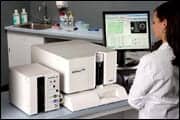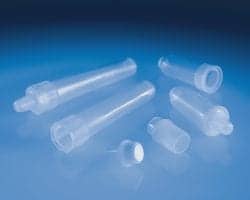 |
Genetic lab testing is increasingly being used for disease prevention—even in the unborn and newborn. Improvements in prenatal testing are making it quick and simple to detect whether prospective parents are carriers of such diseases as cystic fibrosis (CF), Tay-Sachs disease (TS), and sickle cell anemia. The tests are profitable for labs because they’re highly reimbursable and beneficial for patients and their offspring. In addition to medical tests, genetic testing’s other branch—genealogy—can trace ancestry.
Luminex, Austin, Tex, and Osmetech, Pasadena, Calif, are two manufacturers that are active in the field, particularly in prenatal testing for CF. According to Jeremy Bridge-Cook, Luminex vice president of molecular diagnostics, his company’s xTAG™ CF IVD was the first to be cleared by the FDA for CF testing, in May 2005. Luminex is ready to seek FDA approval for a test that will examine for even more mutations—70—compared to the current 39, which includes the 23 mutations recognized by the American College of Medical Genetics and 16 others that are highly prevalent in such ethnic groups as African Americans and Hispanic Caucasians.
Much genetic testing is for diseases that are ethnicity-specific. Bridge-Cook notes that most genetic lab testing is done on prospective parents to determine if they’re CF carriers and their likelihood of passing the disease along to their offspring. Genetic testing is also common for diseases such as TS, thrombophilia, and sickle cell anemia, which each have strong presences in particular ethnicities. (CF carriers do not have CF, but if they have a child with another carrier, there’s a one-in-four chance that the child will inherit both of the genetic changes that cause CF.)
Multiplexed CF Testing
Luminex’s CF testing product is a kit that uses xMAP® multiplexing technology and runs in 96 microtiter plates. Samples go into a Luminex 200 instrument, which reads the results. Software then interprets the data and provides a report to the lab director, who ultimately communicates the results to the physician. The test is being used in both reference and hospital labs, and provides improved accuracy, precision, and reproducibility over previous testing methods, Bridge-Cook says.
Typically, whole blood is tested, and results take 6 or 7 hours to obtain. It has two uses: for carrier screening as part of family planning to inform prospective parents if they’re CF carriers, and as a diagnostic testing aid, because many states mandate performance of a variety of genetic and metabolic tests on newborns, one of which is often CF, Bridge-Cook says.
He notes that screening for CF carriers has became much more widely adopted since 2001, when the American College of Medical Genetics and the American College of Obstetrics & Gynecology recommended that the test be performed. “There’s a fairly high prevalence of CF carriers in Caucasians, African Americans, Hispanics, and Ashkenazi Jews, and less in Asian Americans. The test would be offered depending on the appropriate level of information,” he says. And he notes that reimbursement is generally very good for this test because of the two associations’ recommendations. “That basically defined it as a standard of care,” he says.
“A key aspect of our CF test is the importance of multiplexing. Many genetic diseases have more than one mutation. Our test allows all mutations to be tested simultaneously in one well,” he says.
So far the test is not automated, but Bridge-Cook says that Luminex is working toward that.
Genetic Variation Affects Drug Response
 |
| xMAP® multiplexing technology from Luminex is used in many genetic assays. |
Luminex also is working on a genetic test to determine patient sensitivity to the anticoagulant drug warfarin (Coumadin), which relates to deep-vein thrombosis.
Warfarin testing is done to determine patient sensitivity to the drug, which is widely used to prevent potentially fatal clots in blood vessels. That’s because one third of patients receiving warfarin metabolize it differently than expected, with a higher risk of bleeding. Warfarin is often implicated in emergency department visits for adverse drug events, and the correct dose depends on factors including a patient’s age, diet, and use of other medications.
Patients who receive doses that are higher than needed to correctly thin the blood are at risk of life-threatening bleeding. Those who receive doses that are too low may remain at risk of life-threatening blood clots. A pharmacogenetic test is used to test for warfarin sensitivity, and a patient would have regular blood tests—international normalized ratio (INR) tests—to determine their blood-clotting factor. Since warfarin has a high incidence of reactions, INR testing is vital to determine whether patients are receiving too little or too much warfarin.
Some of the unexpected response to warfarin depends on variants of two genes: CYP2C9 and VKORC1. In September, the FDA cleared for marketing the Nanosphere Verigene Warfarin Metabolism Nucleic Acid Test, which tests for the genes.
In December, Osmetech Molecular Diagnostics submitted the eSensor® Warfarin Sensitivity Test on the eSensor® XT-8 System to the FDA. The XT-8 instrument (including onboard CPU and a touch screen) is approximately the size of a 17-inch CRT monitor and offers quick, random-access genetic testing with a simple one-page report. The XT-8’s single-touch user interface minimizes technician time, requiring only bar-code entry of sample information.
The XT-8 System is based on the same electrochemical detection microarray technology as the company’s FDA-cleared eSensor® Cystic Fibrosis Carrier Detection System. The CFCD System includes the 4800 instrument and all reagents required for amplification, genotyping, and detection. The simple one-page report format offers laboratories clear “carrier/no-carrier” results, versus the numerical scores provided by an ASR test.
Over the last 2 years, Osmetech has seen a large increase in the number of physicians and laboratories interested in CF prenatal screening. To meet this need, Osmetech offers a unique “Laboratory Partnership” program in which the company directly enables the laboratory to educate physicians and patients on the clinical benefits of prenatal CF screening.
Interplay of Genetics and Cancer
Genetic testing also is done for such diseases as breast cancer. The FDA has approved a test from Dako Denmark A/S, Glustrup, Denmark, that helps assess the risk of tumor recurrence and long-term survival for patients with relatively high-risk breast cancer. The TOP2A (topoisomerase 2 alpha) gene plays a role in DNA replication, and the TOP2A FISH pharmDx is the first approved device to test for the gene in cancer patients. The test is suitable for breast cancer patients who are premenopausal or for whom tumor characteristics, such as tumor size or lymph node involvement, suggest a higher likelihood of tumor recurrence or decreased survival.
 |
| eSensor® XT-8 System |
In addition, Genomic Health has developed a gene test that predicts a woman’s risk for breast cancer recurrence. Oncotype DX also determines which breast cancer patients are likely to benefit from chemotherapy, even for those whose tumors are relatively more advanced. Most patients do not benefit from chemotherapy, but physicians have not been able to predict which patients could.
Oncotype DX analyzes a specific set of genes within a tumor to determine a Recurrence Score™. The Recurrence Score is a number between 0 and 100 that corresponds to a specific likelihood of breast cancer recurrence within 10 years of the initial diagnosis. The Oncotype DX test has been utilized by nearly 7,000 physicians having ordered more than 40,000 tests, and health plans covering 50% of the US insured lives providing reimbursement for Oncotype DX. The American Society of Clinical Oncology recently included Oncotype DX in its molecular testing guidelines for cancer.
Genealogy to Genetic Disorders
Bennett Greenspan, president and CEO of familytree.com, performs genetic testing for genealogy purposes. In the past 7 years, he’s tested about 350,000 people worldwide and has done research for the National Geographic Genographic Project.
But in 2008, after years of being asked by genetic genealogy clients for medical and diagnostic testing, Greenspan and several scientists and entrepreneurs formed a separate company, DNATraits, to offer those types of testing to the general public. They recently launched a diagnostic Web site that offers tests for, among others, blood-clotting disorders and CF that offers 115 markers, which Greenspan says is the broadest CF panel offered. Other tests are mostly being used by Ashkenazi Jewish prospective parents. That ethnic group, while predisposed to CF like many other populations, also carries TS, and prospective parents want to know if they’re carriers who could pass TS along to their unborn children.
Greenspan says that before TS testing began in 1970, about 40 to 50 children died annually of TS, always within 24 months of birth. In the 1980s, deaths dropped by 80% because of community-wide screening. He notes that sickle cell anemia strikes 1 in 500 African Americans, and believes that similar decreases in sickle cell anemia can be achieved if testing and education take place in the African American community.
In the near future, DNATraits.com will offer tests for mutations for such diseases as Type 2 diabetes, restless leg syndrome, and lupus, among others.
Paternity testing (which the new company does not offer) is the most commonly requested genetic test by far, he says, but diagnostic genetic testing is widespread and breaks down by various ethnicities’ predispositions: TS for Ashkenazi Jews, sickle cell anemia for African Americans, and a variety of tests for Amish, who marry within the community and therefore do not introduce genetic variation. Diagnostic tests also can be nonethnic-group specific, such as CF, which affects the general population with carrier frequencies of 1:25.
Those taking the tests are sent saliva collection kits. They expectorate into a vial, and tests are run on the saliva using either sequencing or as Single Nucleotide Polymorphism tests. Results are reported only by genetic counselors, whether the tests are positive or not. “You don’t interpret the results yourself, although you probably could since Mendelian results are binary,” Greenspan says.
-

- To stay current on genetic testing, visit www.clpmag.com.
If both parents are carriers, they can either decide not to reproduce or can take precautions for the possibility of having a baby with an inherited Mendelian disorder. The CF test costs $180, while a very large Ashkenazi (Eastern European Jewish) panel of 26 diseases sells for about $500. Sickle cell anemia tests are also being offered to African Americans.
These diagnostic tests will not be performed in the Family Tree DNA laboratory, which opened in 2006. Rather, all diagnostic tests will be performed at an affiliate facility in England. No medical diagnostic testing will be done there, Greenspan says, because he did not want genealogy clients to think their tests were being used for that purpose.
Gary Tufel is a contributing writer for CLP.





